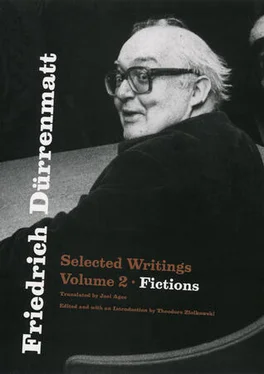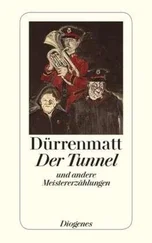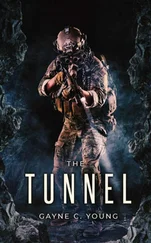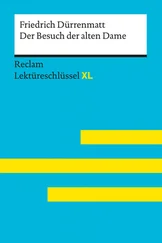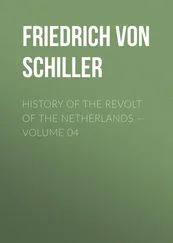Friedrich Dürrenmatt
THE TUNNEL
A twenty-four-year-old man, fat, who in order to prevent the horror he saw behind the scenes from coming too close (that was his ability, perhaps his only ability) liked to stop up the holes in his flesh, since it was through them that the monstrousness could stream in, and did so by smoking cigars, Ormond Brasil 10, and by wearing a pair of sunglasses over his regular glasses, and wads of cotton in his ears; this young man, still dependent on his parents, and enrolled in some nebulous course of study at a university that could be reached by railroad in two hours, boarded his usual train one Sunday afternoon, time of departure 5:50 p.m., time of arrival 7:27 p.m., in order on the following day to attend a seminar that he had already decided to cut. The sun was shining in a cloudless sky when he left his place of residence. It was summer. The train ran between the Alps and the Jura mountains, past rich villages and small towns, then alongside a river, and after a little less than twenty minutes, shortly after Burgdorf, it dipped into a small tunnel. The train was overcrowded. Having entered in the front of the train, the twenty-four-year-old man laboriously worked his way through the crowds to the back, sweating and making a somewhat befuddled impression. The travelers were crowded together; many of them sat on suitcases. The second-class compartments were filled up as well; only the first-class cars were sparsely booked. When the young man had finally struggled through the tangle of families, recruits, students, and lovers, constantly tossed back and forth by the train, thrown against one body and then another, lurching against stomachs and breasts, he found some room in the last car, indeed so much room that in this third-class section—where cars with compartments are rarely found—he had a whole bench to himself. Directly opposite him in the closed chamber sat a man who was even fatter than he, playing chess by himself, and in the corner of the same bench, near the aisle, sat a red-haired girl who was reading a novel. Thus he was already sitting by the window and had just lit an Ormond Brasil 10 when the tunnel came, which seemed to last longer than usual. He had traveled this line many times before, almost every Saturday and Sunday for the past year, and had sensed the tunnel’s presence but never really taken note of it. A few times he had intended to give it his full attention, but each time it came, he would be thinking of something else and not catch the brief dip into darkness, and when he would remember to look, determined to notice this time, the tunnel had already passed; that’s how short the tunnel was and how quickly the train passed through it. It was no different now: once again he had not taken off his sunglasses when they entered, since he wasn’t thinking of the tunnel. Just a moment before, the sun had been shining with full intensity, and the landscape through which they were traveling (the hills and forests, the distant Jura mountains, and the houses of the small town) had looked like gold, so brightly had everything shone in the evening light, so brightly that now he became conscious of the abrupt change to darkness. Probably that was the reason why the passage through the tunnel seemed longer to him. It was completely dark in the compartment, since, due to the tunnel’s shortness, the lights had not been turned on; for, any second, the first glimmer of day would surely appear in the window, and widen with lightning swiftness, and burst in mightily with a full, golden radiance; but when the darkness continued, he took off his sunglasses. At the same moment, the girl lit a cigarette, evidently annoyed that she couldn’t go on reading her novel, or so it appeared to him in the reddish flare of the match; his wristwatch with the phosphorescent dial showed ten after six. He leaned back into the corner between the wall of the compartment and the window and busied himself with his confused studies, which no one quite believed in, with the seminar he had to attend the next day and which he would stay away from (everything he did was just a pretext for achieving order behind the facade of his activities, not the order itself, just the sense of a possible order, in view of the horror against which he padded himself with fat, stuck cigars in his mouth, stuffed wads of cotton in his ears), and when he looked back at his watch, it was six fifteen and they were still in the tunnel. This confused him. Although the lights went on in the compartment and the red-haired girl was able to continue reading and the fat man resumed his chess match against himself, outside, beyond the windowpane, in which the whole compartment was now mirrored, the tunnel was still there. He stepped into the aisle, where a tall man in a light-colored raincoat was walking to and fro, a black scarf wrapped around his neck. Why would he do that in this weather, he thought and looked into the other compartments of the car, where people were reading newspapers and chatting. He went back to his corner and sat down. The tunnel had to end at any moment, any second; his wristwatch indicated almost six twenty; he was annoyed at himself for not having ever noticed the tunnel, which had been going on for fifteen minutes already and was evidently a very significant tunnel, considering the speed at which the train was running—probably one of the longest tunnels in Switzerland. It seemed rather likely, therefore, that he had taken the wrong train, even though for the moment he couldn’t remember a tunnel of this length and importance just twenty minutes away from his home town by rail. So he asked the fat chess player whether this was the train to Zurich, which he confirmed. The young man replied that he’d had no idea there was such a sizable tunnel on this route, but the chess player retorted, somewhat angrily, since this was the second time he had been interrupted in the middle of a difficult calculation, that there were lots of tunnels in Switzerland, a very large number of them indeed, and that even though this was his first visit to this country, it was something one noticed right away; and besides, he had read in a statistical yearbook that there were more tunnels in Switzerland than in any other country. But now, he said, he was awfully sorry, but he had to give all his attention to an important problem in the Nimzovich defense, so he must ask to be left undisturbed. The chess player’s reply was polite but unequivocal; the young man realized he could not expect an answer from him. He was convinced that his ticket would not be accepted; and when the conductor, a pale, gaunt man, remarked, rather nervously it seemed, to the girl, whose ticket he had taken before anyone else’s, that she had to change trains in Olten, the twenty-four-year-old man still did not abandon hope, so firmly convinced was he that he had boarded the wrong train. “I’m sure I owe something, I’m supposed to be going to Zurich,” he said without taking the Ormond Brasil 10 out of his mouth, and handed the conductor his ticket. “You’re in the right train, sir,” the conductor replied after examining the ticket. “But we’re driving through a tunnel!” the young man exclaimed with annoyance and quite forcefully, for now he was determined to clear up this bewildering situation. The conductor said that they had just passed Herzogenbuchsee and were approaching Langenthal. “It’s true, sir, it’s twenty past six now.” “But we have been driving through a tunnel for the past twenty minutes,” the young man insisted. The conductor seemed not to understand. “This is the train to Zurich,” he said, glancing at the window himself now. “Twenty after six,” he said again, somewhat uneasily this time, it seemed; “Olten’s coming up soon, time of arrival six thirty-seven p.m. There must have been bad weather all of a sudden, that would account for the night, maybe a storm, yes, that must be it.
Читать дальше
